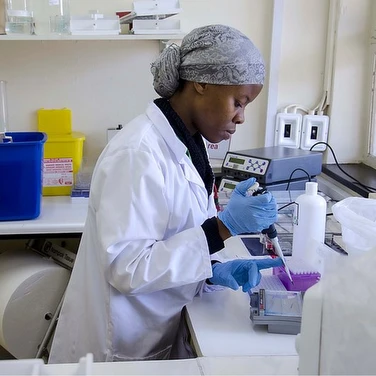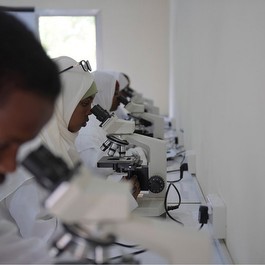Share your experience and help others understand the real-world benefits of following CLSI guidelines. Whether it's improved accuracy, enhanced efficiency, or better compliance, your story can inspire and guide fellow professionals. Submit your experience today and contribute to a global conversation on laboratory excellence!
Lab Innovation for Excellence (LIFE) in Zambia
Overview
With the support of the Zambian Ministry of Health (MOH) and the US Centers for Disease Control and Prevention (CDC), CLSI has been supporting laboratories in Zambia since 2010. More recently, in conjunction with Centre for Infectious Disease Research in Zambia—Lab Innovation for Excellence (CIDRZ LIFE) project, quality management system (QMS) activities have expanded to reach more laboratories.
This technical support is intended to (1) strengthen laboratories that are implementing a QMS to improve the quality of operations, and (2) build the skills and knowledge of biomedical scientists, medical laboratory professionals, and laboratory leadership to enhance the workforce capacity across the country.

Overview
With the support of the Zambian Ministry of Health (MOH) and the US Centers for Disease Control and Prevention (CDC), CLSI has been supporting laboratories in Zambia since 2010. More recently, in conjunction with Centre for Infectious Disease Research in Zambia—Lab Innovation for Excellence (CIDRZ LIFE) project, quality management system (QMS) activities have expanded to reach more laboratories.
This technical support is intended to (1) strengthen laboratories that are implementing a QMS to improve the quality of operations, and (2) build the skills and knowledge of biomedical scientists, medical laboratory professionals, and laboratory leadership to enhance the workforce capacity across the country.
The Situation
Zambia is a landlocked country in SubSaharan Africa that has long struggled with infectious diseases and capacity constraints in its health infastructure. Its Ministry of Health (MOH) has been actively focused on building infrastructure and health systems, with support from international organizations like the WHO and CLSI. This work has included data and surveilliance, workforce cdevelopment, prevention and emergency response protocols, and innovation and research.
The Program
The CLSI-CDC-CIDRZ LIFE project entailed:
- Providing mentorship to priority laboratories to assist them in developing a QMS and working towards attainment and maintenance of ISO 15189-aligned accreditation.
- Building QMS capacity through focused trainings to advance knowledge, skills, and practice.
- Developing a cadre of QMS mentors and quality assessors within Zambia to sustain the gains of the program.
- Providing technical assistance to lay the groundwork for the establishment of a national external quality assessment program and a national laboratory certification program.
Also, in May 2024, in coordination with the Ministry of Health (MOH) Zambia and Centre for Infectious Disease Research in Zambia (CIDRZ), CLSI facilitated a Risk Management Workshop in Lusaka, Zambia. This crucial training included recommendations based on risk management for laboratories to develop quality control plans tailored to the combination of measuring systems, laboratory settings, and clinical application of the tests in alignment with CLSI EP23 Laboratory Quality Control Based on Risk Management, 2nd Edition.

The Results
The results of CLSI’s partnership with Zambia have been transformational:
- 8 laboratories within the national health system achieved and maintained international accreditation.
- 9 additional laboratories are undergoing mentorship, implementing QMS, and preparing technical and management procedures in preparation for international accreditation.
- More than 6,500 hours of on-site mentorship with CLSI subject matter experts (SMEs) working side-by-side with in-country laboratory professionals to implement ISO 15189-aligned QMS and other best practices for the laboratory.
- 21 quality assessors trained to conduct standard-based assessments, as well as internal audits. These assessors have been instrumental in conducting Ministry of Health assessments to inform planning.
- 33 trainees equipped with fundamentals in mentorship skills and QMS practice. The goal for this initiative is to sustain the gains that have been realized from the program. After completing training, the experienced mentors will expand the reach of the QMS program to more laboratories across the country.
- 15+ QMS-based workshops with over 300 laboratory professionals trained on QMS topics.
Because of QMS implementation in laboratories throughout Zambia, thousands of Zambians have access to high-quality laboratory test results. Improvements in diagnostic capabilities positively affect patient care as doctors and patient care teams can make medical decisions based on timely and accurate laboratory results.
Share Your Experience with CLSI Standards in your Laboratory
